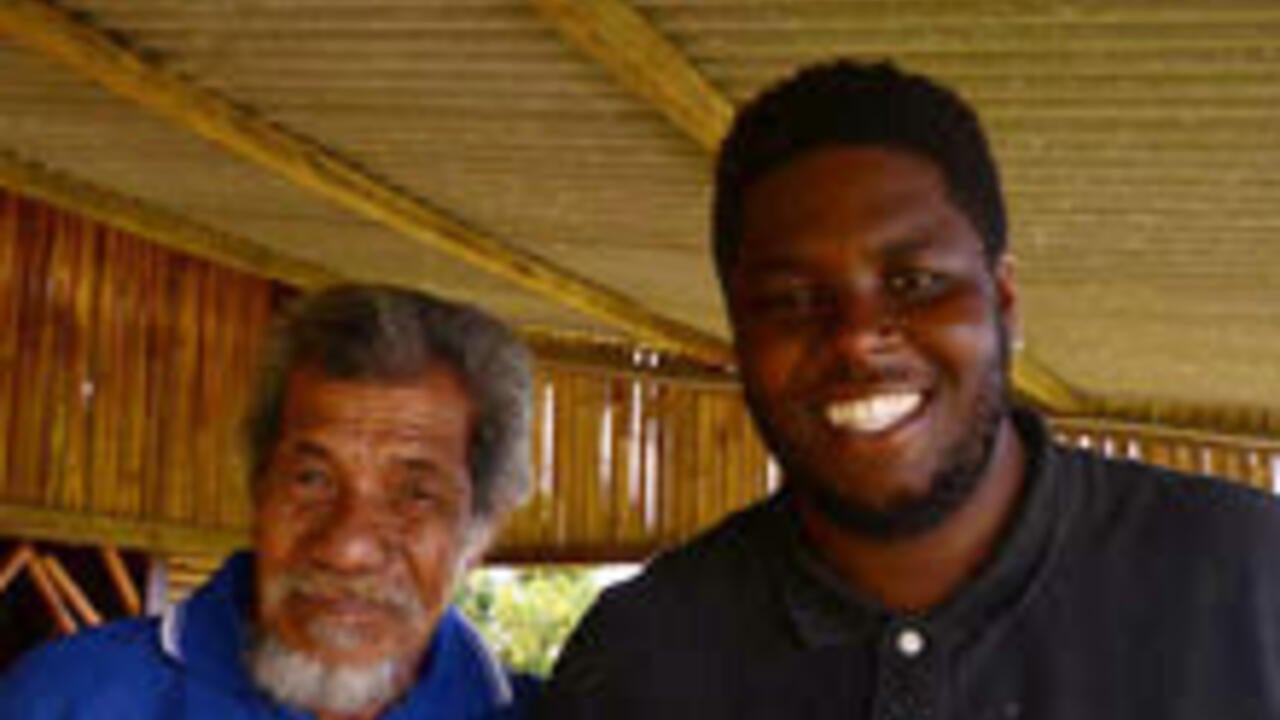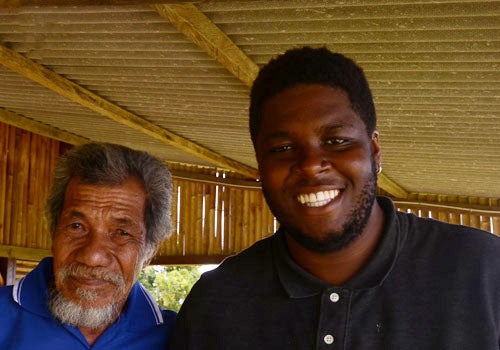
New arts grad lands United Nations job in Indonesia
Ryan Haughton is a natural resource governance and innovation consultant

Ryan Haughton is a natural resource governance and innovation consultant
By Claire Prime Faculty of Arts
Ryan Haughton, (right) with Bapak Tua, (left) the head of KOMUNTO in Indonesia
Ryan Haughton would be attending convocation this week, if he weren’t so far away.
The graduating Master of Global Governance student’s career has taken off since he landed an internship with the United Nations Development Programme (UNDP) in Jakarta, Indonesia.
Last September, Haughton became a local economic development intern, supporting sustainable development projects in the country. When his contract ended in March, he accepted a position as a natural resource governance and innovation consultant. Besides working to improve resource management, the role allows him to immerse himself in the culture and explore the country.
“Every moment I’ve spent here has been special,” he says. “My work is meaningful and I’ve had the opportunity to travel and meet new people while really getting to know the culture.”
As the son of immigrant parents in Toronto, Haughton has always felt like a global citizen. In his hometown and at Waterloo, he thrived on learning about other cultures, trying new foods and meeting new people.
He picked Indonesia for his placement because he wanted to push himself; he didn’t want to travel to one of the countries he had studied in his courses. “I knew absolutely nothing about Indonesia,” he says. “I really wanted to step outside my comfort zone.”
When Haughton landed in Jakarta, he immediately started learning about the country and its people. With help from colleagues, locals, expats and Google Translate, he found an apartment in Kebon Kacang, in Central Jakarta, learned how to hail a cab, order food and ask simple questions.
“I love living in Jakarta,” he says. “I'm from a big city and I couldn't imagine living anywhere that was small or not constantly awake. It's been a great cultural experience for me."
His position often takes him in and around Jakarta. He has supported an agency restoring peatlands; helped coordinate efforts to improve the monitoring and law enforcement of natural resources crimes; and strategized ways to develop tourism in the Wakatobi region as a way to improve marine conservation efforts and local development.
The skills he developed through the Global Governance program have been invaluable in his career. “The program helped to enhance my critical thinking and writing capabilities and provided experiences, such as writing policy briefs, which helped me in my new role."
On the weekends, he explores the country’s archipelagos by plane, boat, car and motorbike. So far, he’s visited Thousand Islands, Karimunjawa, Yogyakarta, Bali, Lombok, Puncak, Bandung and Bogor. On weeknights, he enjoys the night life in the city, tries out new foods and tastes the coffee at some of the hundreds of local cafes. Though the country’s 240 million people collectively speak more than 300 languages, this hasn’t stopped Haughton from making new friends.
“The expat community here is quite large, but I've also made a lot of Indonesian friends too,” he says. “The only problem is that many of the expats are only here for short periods of time and the same goes for many of the Indonesian interns I work with, so I'm often having to say goodbye. However, one good thing is I now have friends all over the world.”

Insignia for Companion, Officer and Member of the Order of Canada. (Photo credit: Sgt Johanie Maheu, Rideau Hall © OSGG, 2019.)
Read more
Alumni and honorary alumni recognized for shaping Canada’s health, policy, justice and financial sectors

Read more
Meet five exceptional Waterloo graduate students crossing the convocation stage as Class of 2025 valedictorians

Read more
Twenty-six researchers receive federal funding to drive discovery, innovation and research infrastructure development
The University of Waterloo acknowledges that much of our work takes place on the traditional territory of the Neutral, Anishinaabeg, and Haudenosaunee peoples. Our main campus is situated on the Haldimand Tract, the land granted to the Six Nations that includes six miles on each side of the Grand River. Our active work toward reconciliation takes place across our campuses through research, learning, teaching, and community building, and is co-ordinated within the Office of Indigenous Relations.